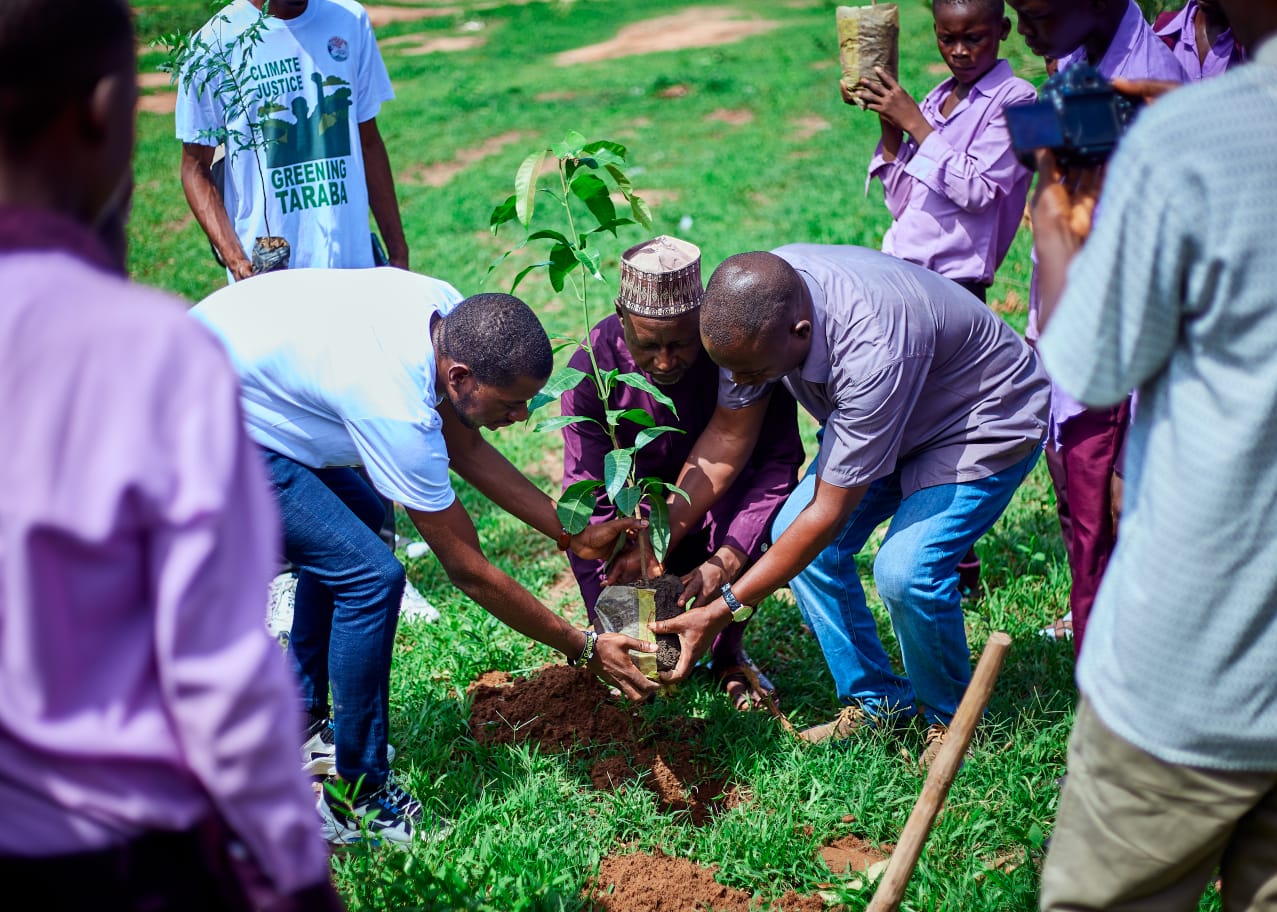The Greening of Taraba
By John Geraji Jacob, OMNIA Community Organizer, Taraba State, Nigeria
Taraba State, located in the northeastern region of Nigeria, has for years faced severe
environmental challenges worsened by the realities of climate change. Communities in
the state are increasingly witnessing the destruction of school buildings, homes, and
public infrastructure by whirlwinds and violent storms. Rooftops are being blown off,
trees uprooted, and farmlands rendered unproductive. These signs of ecological
imbalance are becoming more requent and devastating.
With a population of over 3 million people spread across diverse ethnic and religious
communities, Taraba is particularly vulnerable to climate shocks. The state’s landmass,
once blessed with thick vegetation, is fast losing its green cover. The harsh
consequences of indiscriminate tree felling, desert encroachment, and poor waste
management are evident. According to Global Forest Watch, Taraba lost over 91,000
hectares of tree cover between 2001 and 2020, contributing to over 28 million tonnes of
CO₂ emissions. In Kurmi Local Government Area alone, vegetation fell from 97% in 1999
to just 52% by 2019.
As members of the OMNIA Interfaith Peacemaker Teams (IPT) in Jalingo, we became
increasingly burdened by these challenges, and began to ask ourselves: what urgent,
relevant and winnable action can we take to restore hope and nature in our
communities? This gave birth to the “Greening Taraba Project.”


The vision was simple yet powerful—restore our environment, empower young people,
and promote climate justice through tree planting and awareness. With no major grants
at the start, we began mobilizing local resources, voluntary donations, and community
goodwill. Soon, a network of passionate youth and faith leaders rallied around the idea.
Our first major awareness action was an online webinar on “Climate Change and Justice,”
held on May 4th, 2025. It recorded over 50 registrants, with more than 30 people
attending live. The sessions were enlightening, engaging,and deeply reflective.
Participants expressed their passion to take concrete action and be part of the solution.
The momentum built up to the tree planting event on May 29,2025. In Phase 1 of the
project, we successfully planted 100 trees—mango, eucalyptus, neem, malina, and
blackcurrant—across 6 schools, 8 mosques, and 11 churches inJalingo. The response
from volunteers was overwhelming; 42 young people joined with energy and
commitment.
Teachers and students were moved by the experience. Mr. Lawal, a school principal, was
so inspired that he proposed the formation of a “GreeningTaraba Club” in his school to
care for the trees and continue advocacy. Our sustainability strategy now includes
student clubs, ongoing monitoring, and expansion plans.
The project drew the attention of the Nigerian Television Authority (NTA), Jalingo, which
featured the story in their evening news broadcast, giving it wide visibility. Since then,
young people across the state and even beyond have expressed interest in joining future
phases.
One particularly inspiring outcome came from Adamawa State. A close friend and
changemaker, Wepwa Uriah Kpanah, and young people in the Demsa Local Government
Area, were inspired by our work. They have now begun their own community tree
planting initiative— “Greening Adamawa”—set to launch on July 28, 2025. This ripple
effectis proof that small actions can inspire powerful change.
The Greening Taraba Project is now more than a campaign—itis a movement. With its
scalable model, strong grassroots involvement, and moralclarity, it presents an
investable opportunity for government agencies, NGOs, and individual philanthropists. It
merges faith, science, and youth action to tackle one of the most pressing issues of our
time.
We are just getting started. Together, we can green Taraba, green Adamawa, and green
Nigeria.
Related News

Interfaith Peacemaker (IP) Teams in Taraba State, Nigeria, engaged in an urgent, relevant and winnable action of plating trees.
Learn More
OMNIA's Climate Justice IP Team wants you to get religious leaders to demand that governments support Climate Justice at the UN.
Learn MoreMake Peace Work
OMNIA Institute for Contextual Leadership
5001 S. Ellis Avenue, Chicago, IL 60615, USA
.png)
